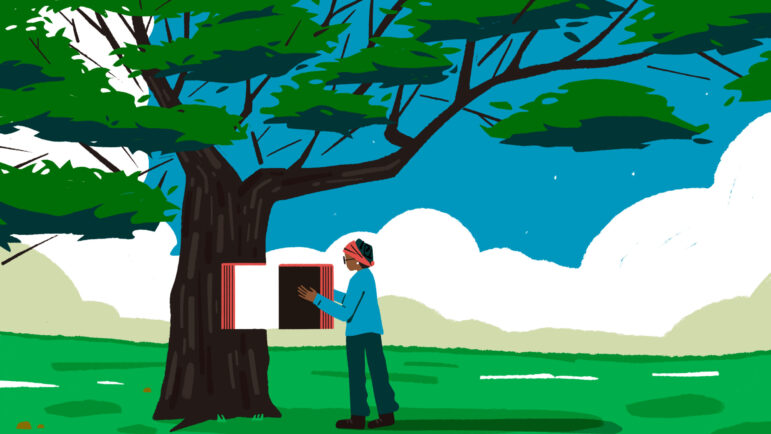By Jeffrey Kelly
This story was originally produced as part of NPR’s Next Generation Radio project as part of their collaboration with the Gulf States Newsroom.
Under the trees in Railroad Park, Salaam Green, Birmingham’s inaugural poet laureate, sat on a sun-warmed wooden bench, listening to the chirps of birds. This is where, according to Green, the city felt most alive; it was where she, a rural girl at heart, felt at home.
“Nature makes me want to come closer into Birmingham, closer into the streets, closer into where the trees kind of bloom and where they live,” she said.
For Green — originally from Greensboro, Alabama — home wasn’t just Birmingham or her grandmother’s house. It was all the sensory details of her life: the smell of her grandmother’s kitchen, the sound of her footsteps and the feeling of rain. Yet, the biggest sensory experience in her life was poetry.
“Poetry is kind of the rhythm of life,” she said. “It’s the whistling of when I’m having a good day. It’s the whispering when I need to kind of say, ‘I need a nudge to go further.’”
However, Green hadn’t always been in tune with that whisper.
When she moved to Birmingham in 1999 after graduating from the University of Montevallo in Alabama, she didn’t consider herself a poet, or see Birmingham as her home. She’d gone through a divorce and depression in her late 30s that left her in a dark place. She hadn’t yet found her metaphorical oak tree, representing her place of peace.
It wasn’t until after a long career in education and administration that Green found an oak seedling in a creative writing class.
There, with the help of Lucy Jaffe, the class’s teacher, and other Birmingham women, Green’s seedling sprouted into an oak tree that brought her back to herself.
“I was just able to sit on this lady’s red couch in Birmingham, have hot tea and have chocolate, and have the camaraderie of other women who are artists,” she said. “It was a home that I needed at one of the most trying times in my life.”
With Jaffe’s help, Green realized she was a poet and that writing could heal.
Since then, she’s worked to bring that healing to others so they can find their own oak trees. She’d done this through Literary Healing Arts, a business she started in 2016 that focuses on the same practice of healing she experienced on Jaffe’s red couch through workshops, one-on-one sessions and various speaking events.
Due to her work with the Birmingham community, Green was named Birmingham’s inaugural poet laureate in December 2023.
This allowed her to showcase her meaning of home on a larger scale through speaking engagements and her new chapbook, Once Upon a Magic City. The chapbook came out during Poetry Month this April, and celebrates the contours of what makes the city “magic,” while introducing readers to the magic of poetry.
Many of those poems remind Green of home. One in particular, “Little Girls of Birmingham,” takes influence from her experience as a young girl in Greensboro sitting under an oak tree juxtaposed with the 16th Street Baptist Church bombing that killed four little girls.
She said when she started the poem she didn’t necessarily want it to be only about the historical event that happened during the civil rights movement.
“I want it to be also a way that we can reimagine who those little girls continue to be in our lives, and also give the opportunity for other little girls and women and people in Birmingham to kind of float above who they are, as well,” Green said.
She said she’s found her oak tree in so many places in Birmingham, so she wanted to honor them and help them find theirs, which she believes creatives always try to do in their work.
No matter what she’s writing about, whether it’s the day-to-day things happening in Birmingham, violence, or the things the mayor’s doing for progress, Green said she hopes “people see that it’s all coming from a space of homecoming.”
Green marveled at the park’s beauty and tranquility as she walked along a passageway bridge. She walked slowly, pointing out the babble of the water, how she could almost hear the turtles swimming through it, the whistling of the birds and the rudbeckia goldsturm that stood at the water’s edge on the other side.
“I’m thinking, why don’t I have a Railroad Park poem?” she said. “It’s really inspiring to be here. It really gives me an opportunity to think about writing a poem about the place of home that sits here.”
She contemplated how she’d want to include everything she saw in the poem, not just nature but the people who care for the park, because “they deserve to be a part of that poem as well.” As she continued to round the path, the park’s rhythm inspired an opening line for the poem.
“Thank you, Railroad Park, for being such a home to so many,” she said. “Thank you, Railroad Park, for being a community to me.”

